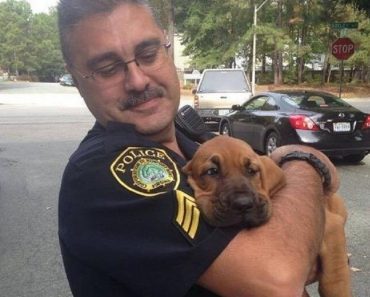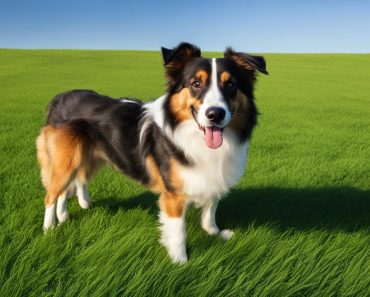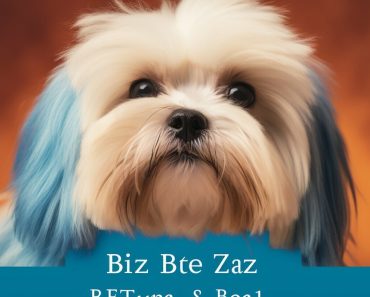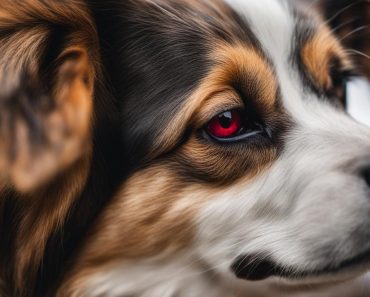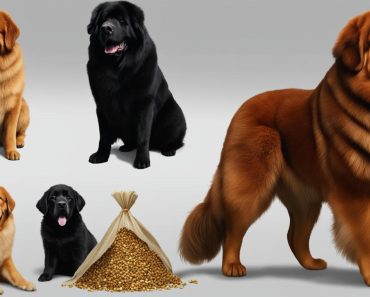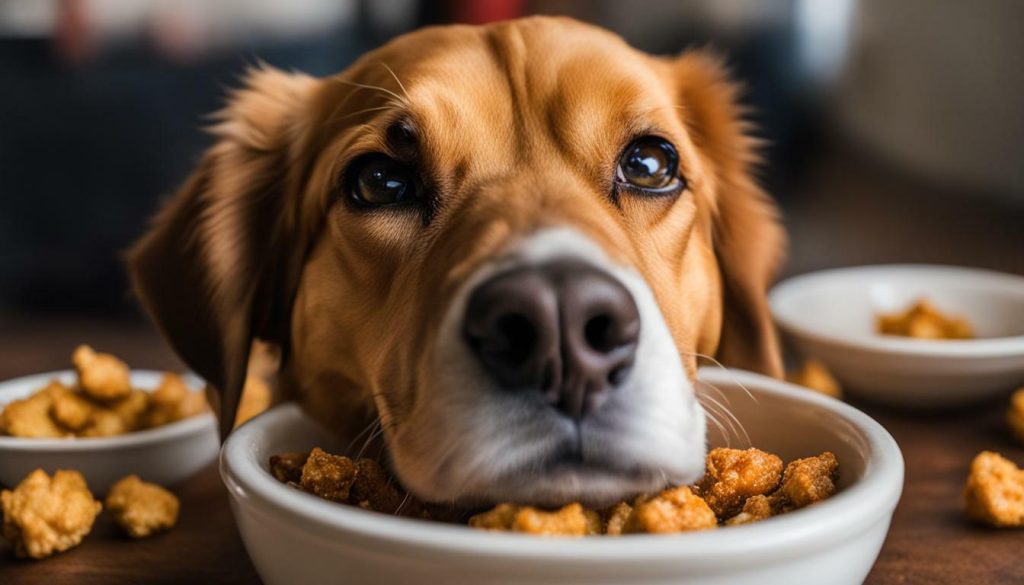
As a responsible pet owner, it’s important to understand whether it is safe for dogs to consume chicharrones, also known as pork rinds. While these crispy snacks may be tempting to share with your furry friend, it’s crucial to consider their potential impact on your dog’s health.
Key Takeaways:
- Pork rinds or chicharrones are unsafe for dogs due to their high fat, sodium, and calorie content.
- These snacks can lead to dog health issues, including obesity, pancreatitis, and high blood pressure.
- The seasoning and additives in chicharrones, such as spicy flavors or garlic and onion seasonings, can be toxic to dogs.
- Opt for healthier alternatives, such as dehydrated pork treats or other dog-friendly snacks, to satisfy your dog’s cravings.
- If your dog accidentally consumes chicharrones and shows symptoms like vomiting, diarrhea, or signs of salt poisoning, seek veterinary attention.
By prioritizing your dog’s well-being and providing them with a balanced and nutritious diet, you can help ensure their long-term health and happiness.
Why Chicharrones Are Not Safe for Dogs
While chicharrones may be a tempting snack for dogs, they can pose serious health risks to our furry friends. These crispy pork rinds are high in fat, sodium, and calories, which can lead to a range of health issues for dogs. Obesity is a major concern, as excessive weight can strain a dog’s joints and organs, leading to decreased mobility and an increased risk of developing conditions such as arthritis or diabetes.
In addition to the high-fat content, chicharrones often contain seasonings and additives that can harm dogs. Spicy flavors or garlic and onion seasonings, commonly found in these snacks, can cause digestive issues and even toxicity in dogs. Some dogs may be particularly sensitive to these ingredients and experience adverse reactions such as vomiting, diarrhea, or allergies.
If a dog accidentally consumes a small amount of chicharrones, they may not experience any severe side effects. However, regular or excessive consumption can have serious consequences. It is best to avoid giving dogs pork rinds altogether and instead choose healthier alternatives. Dehydrated pork treats or other dog-friendly snacks can provide a tasty and safe alternative for your furry companion.
If you suspect your dog has consumed chicharrones and is displaying symptoms such as vomiting, diarrhea, or signs of salt poisoning, it is important to seek veterinary attention immediately. A vet can assess the situation and provide appropriate treatment to ensure your dog’s well-being.
| Health Risks of Dogs Eating Chicharrones: |
|---|
| High-fat content leads to obesity and related health issues. |
| Seasonings and additives can cause digestive issues and allergic reactions. |
| Sodium content can lead to salt poisoning. |
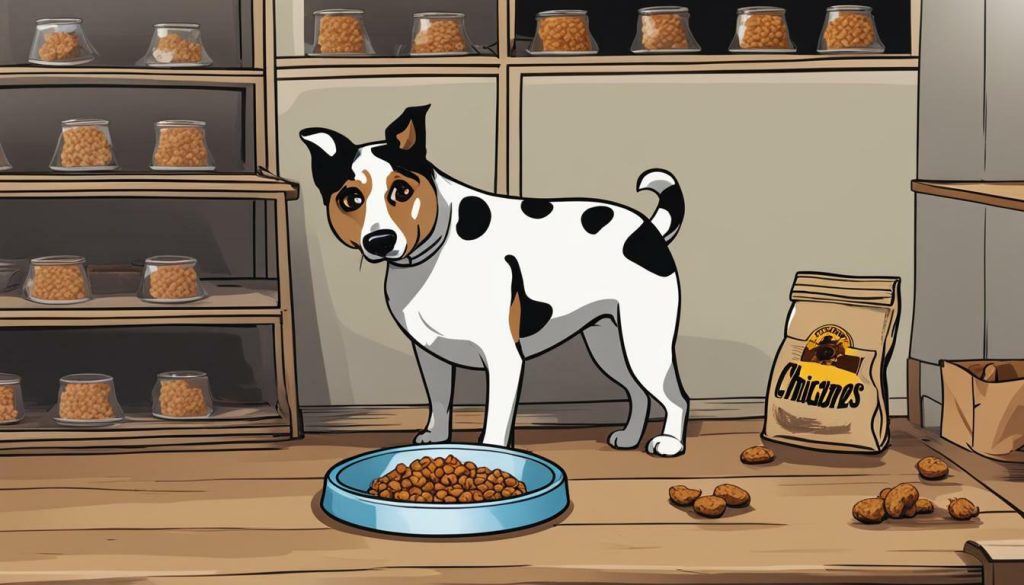
“While chicharrones may be a tempting snack for dogs, they can pose serious health risks to our furry friends.”
Can Dogs Digest Chicharrones?
While dogs can digest meat, chicharrones can be challenging to process due to their high fat content. Dogs have different dietary needs than humans, and their digestive systems are not equipped to handle the fat levels found in pork rinds. Excessive consumption of chicharrones can lead to pancreatitis, a condition characterized by pancreas inflammation. Pancreatitis can cause severe abdominal pain, vomiting, diarrhea, and potentially be life-threatening for dogs.
- Chicharrones are high in fat, sodium, and calories.
- Seasonings and additives can be harmful to dogs.
- Choose healthier alternatives for your furry companion.
In conclusion, pet owners must understand the potential health risks of dogs consuming chicharrones. While these snacks may be tempting, they can lead to obesity, pancreatitis, and other health issues in dogs. To ensure the well-being of our four-legged friends, it is best to avoid giving them chicharrones and opt for healthier treats specifically designed for dogs.
High Fat and Sodium Content in Chicharrones
Chicharrones are notorious for their high fat and sodium content, making them unsuitable for dogs to consume regularly. These crispy pork rinds may be tempting to share with your furry friend, but it’s important to understand the potential health risks they pose to dogs.
When dogs consume high-fat foods, it can lead to weight gain and obesity. Excessive fat intake can also contribute to pancreatitis, a painful pancreas inflammation. Additionally, the high sodium content in chicharrones can harm a dog’s health, raising blood pressure and strain the kidneys and heart.
It’s crucial to prioritize your dog’s nutritional needs and provide them with a balanced diet that supports their overall well-being. While an occasional small piece of chicharrone may not cause harm, regular consumption can lead to severe health issues. Instead, consider offering your dog healthier alternatives, such as dehydrated pork treats or specially formulated dog-friendly snacks.
If your dog accidentally ingests a significant amount of chicharrones or exhibits symptoms like vomiting, diarrhea, or signs of salt poisoning, it’s essential to seek immediate veterinary attention. Your veterinarian can assess the situation and provide appropriate guidance and treatment to ensure your dog’s well-being.
| Health Risks of Chicharrones for Dogs |
|---|
| Obesity |
| Pancreatitis |
| High blood pressure |
| The strain on the kidneys and heart |
Healthier Alternatives to Chicharrones
When it comes to treating your dog, numerous alternatives to chicharrones are both delicious and safe. Consider offering your furry friend:
- Dehydrated pork treats made specifically for dogs
- Vegetable-based snacks, like carrot or sweet potato chips
- Apples or frozen bananas as refreshing treats
- Commercially available, dog-friendly snacks with limited ingredients
By choosing healthier alternatives, you can ensure your dog receives tasty treats without compromising their health. Always consult with your veterinarian regarding your dog’s dietary needs and suitable snacks.
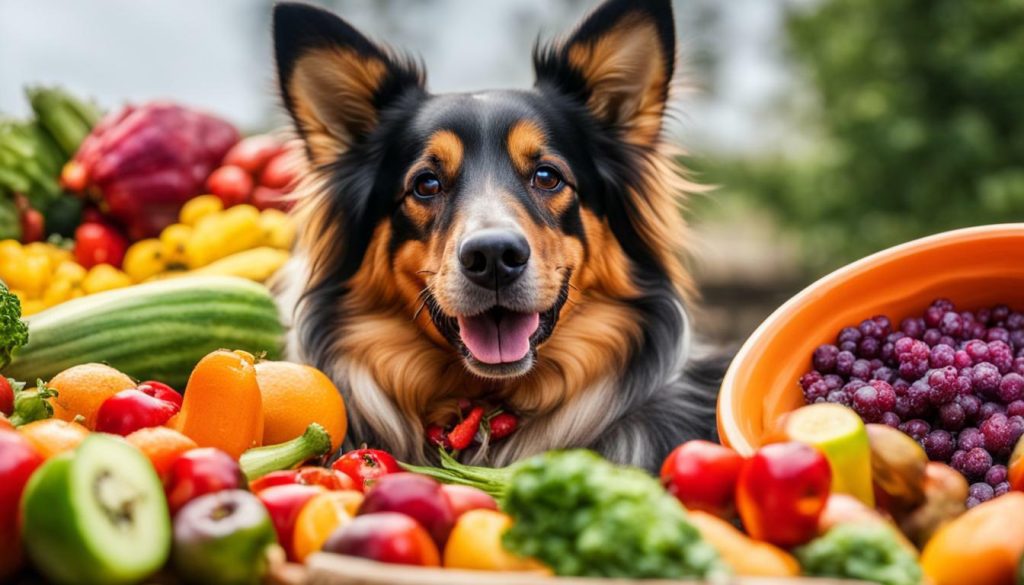
In conclusion, chicharrones should be avoided as a regular part of your dog’s diet due to their high fat and sodium content. These crispy pork rinds can lead to various health issues when consumed excessively by dogs. Prioritize your pet’s well-being by providing a balanced and nutritious diet, and opt for healthier alternatives specifically designed with their dietary needs in mind. You can promote their overall health and happiness by making informed decisions about your dog’s diet.
Health Issues Associated with Chicharrones
Dogs consuming chicharrones can develop a range of health issues, including obesity and pancreatitis. These savory snacks are high in fat, sodium, and calories, making them a poor choice for canine consumption. The excessive fat content can lead to weight gain and obesity, putting strain on a dog’s joints and organs. Obesity increases the risk of various health problems, including diabetes, heart disease, and respiratory issues.
Pancreatitis is another serious concern when it comes to dogs eating chicharrones. The high-fat content in these pork rinds can trigger inflammation of the pancreas, leading to abdominal pain, vomiting, and diarrhea. Pancreatitis can be a life-threatening condition and requires immediate veterinary attention.
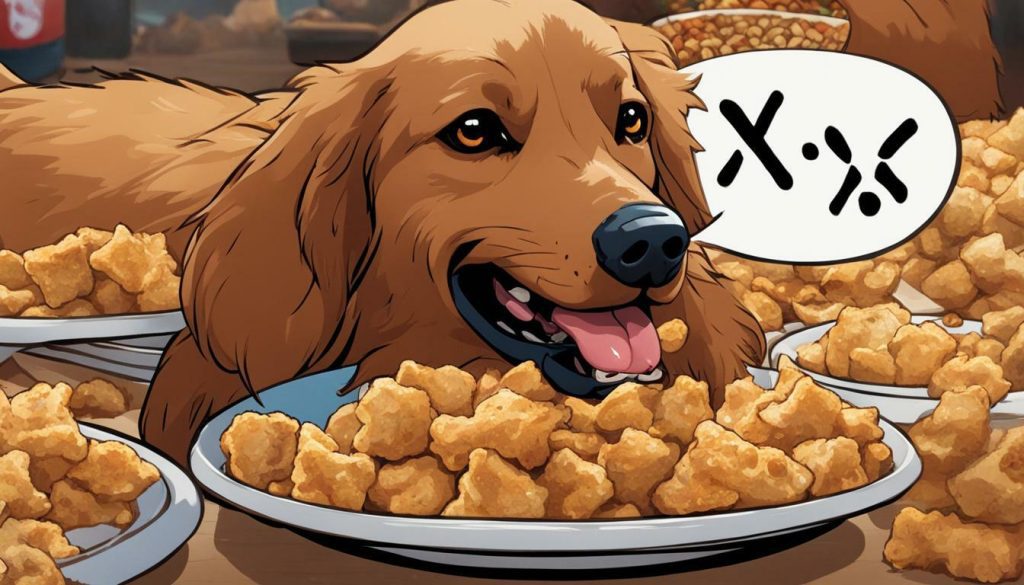
Furthermore, the seasonings and additives often found in chicharrones can harm dogs. Spicy flavors or seasonings with garlic and onion are known to be toxic to canines, causing gastrointestinal irritation and possible damage to red blood cells. It is crucial to remember that what may be a tasty treat for humans can have severe consequences for our furry friends.
Preventing Health Risks
To keep our beloved pets safe and healthy, avoiding giving them chicharrones altogether is best. Instead, choose canine-friendly snacks and treats specifically formulated to meet their nutritional needs. Various dehydrated pork treats on the market provide a safe and flavorful alternative to chicharrones. Additionally, plenty of fruits and vegetables can be given in moderation and serve as healthy dog options.
In case of accidental consumption of chicharrones, closely monitor your dog for any signs of discomfort or illness. If symptoms such as vomiting, diarrhea, or signs of salt poisoning occur, it is essential to seek immediate veterinary attention. Early intervention can make a significant difference in the outcome of their health.
| Health Risks of Dogs Eating Chicharrones: |
|---|
| Obesity |
| Pancreatitis |
| Gastrointestinal irritation |
| Possible damage to red blood cells |
Providing a balanced and nutritious diet is vital for our furry companions. Ensuring they receive appropriate food and treats tailored to their needs promotes their health and well-being. Our responsibility as pet owners is to keep them safe from potentially harmful human snacks like chicharrones.
Toxic Seasonings and Additives in Chicharrones
The seasonings and additives in chicharrones, such as spicy flavors or garlic and onion seasonings, can be dangerous for dogs. These ingredients may seem harmless to humans but can adversely affect our furry friends. Spicy flavors can irritate a dog’s digestive system and lead to diarrhea or stomach discomfort. Garlic and onion seasonings contain compounds that can be toxic to dogs, potentially damaging their red blood cells and causing anemia.
It’s important to remember that dogs have a different tolerance for certain foods than humans. What may be a flavorful snack for us can harm our four-legged companions. Additionally, the high salt content in chicharrones can be problematic for dogs. Excessive sodium intake can lead to dehydration, increased thirst, and even sodium ion poisoning. Dogs, especially those with underlying health conditions, are more susceptible to these effects.
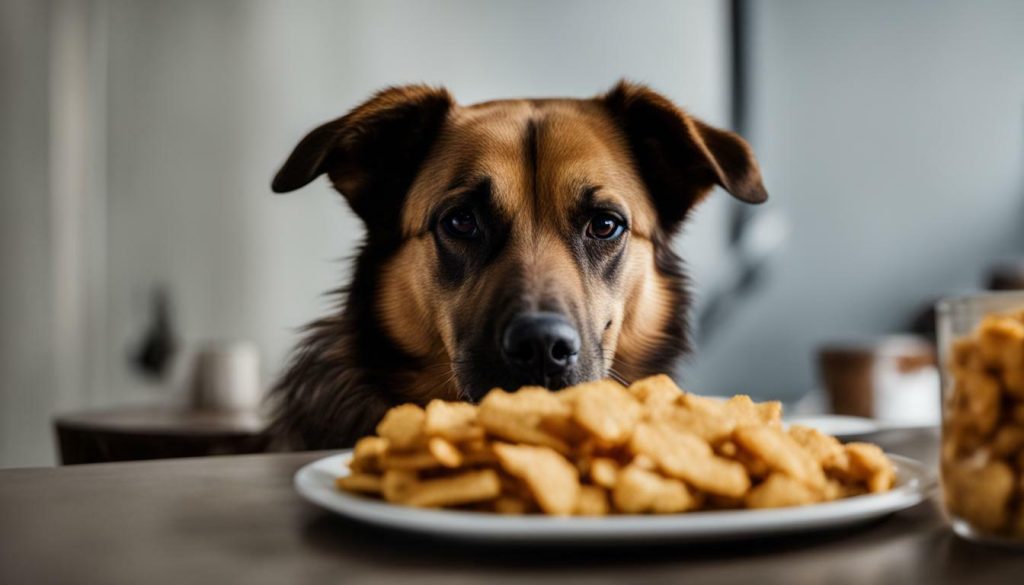
Regarding our pets’ well-being, it’s best to err on caution. Avoid giving dogs any food that contains potentially toxic ingredients or excessive amounts of fat, sodium, or spices. Opting for healthier alternatives is a safer choice. Many dog-friendly snacks are available that provide a tasty treat without the risks associated with chicharrones. Dehydrated pork treats, for example, can offer a similar texture and flavor without the harmful seasonings or additives in chicharrones. Remember, it’s always better to prioritize our dogs’ health and choose snacks that support their nutrition needs.
| Signs of chicharrones poisoning in dogs: | What to do: |
|---|---|
| Vomiting or diarrhea | Seek veterinary attention immediately if the symptoms persist or worsen. |
| Excessive thirst or dehydration | Ensure your dog has access to fresh water and monitor their hydration levels. Seek veterinary advice if you suspect dehydration. |
| Signs of salt poisoning (e.g., increased heart rate, tremors, seizures) | Immediately take your dog to the nearest veterinary hospital for emergency care. |
Moderation and Accidental Consumption
A dog accidentally consuming a small amount of chicharrones may not cause immediate harm, but moderation is still essential. While chicharrones are unsafe for regular consumption, an occasional small bite may not harm a dog’s health. However, it’s important to remember that dogs have different sensitivities, and what may not harm one dog could cause discomfort or illness in another.
Pet owners must observe their dog’s behavior after accidental consumption of chicharrones. Look for any signs of gastrointestinal upset, such as vomiting or diarrhea. Additionally, watch for symptoms related to excessive salt intake, such as increased thirst, tremors, or even seizures. It is best to seek veterinary attention promptly if any concerning symptoms arise.
In instances where accidental consumption occurs, it is advisable to take preventive measures. Ensure that chicharrones or other human snacks are stored securely and out of reach from curious pets. Educate family members and visitors about the importance of not feeding dogs harmful foods. Practicing caution and prevention can minimize the risk of accidental chicharrone ingestion.

While it may be tempting to share snacks with our furry friends, their overall health needs to provide them with proper nutrition. Opt for dog-friendly alternatives, such as dehydrated pork treats or low-sodium, low-fat options specifically formulated for dogs. These alternatives offer a safer snack option and ensure that your dog’s nutritional needs are met. Remember, a balanced and nutritious diet is key to a happy and healthy companion.
Healthier Alternatives to Chicharrones
Fortunately, plenty of dog-friendly snack options are both tasty and nutritious. When looking for alternatives to chicharrones, it’s important to choose snacks that are safe for dogs and provide them with the necessary nutrients. Here are some healthy options to consider:
- Dehydrated Meat Treats: These treats are made from lean meats, such as chicken or beef, that are dehydrated to preserve their natural flavors. They are a great source of protein and can be a satisfying snack for your furry friend.
- Fruits and Vegetables: Many fruits and vegetables are safe for dogs and can make excellent snacks. Blueberries, apple slices, carrot sticks, and green beans are dog-friendly options with vitamins and minerals.
- Yogurt: Plain, unsweetened yogurt can be a healthy and delicious treat for your dog. It is a good calcium and protein source and can help promote a healthy digestive system.
Remember to introduce new snacks gradually and in moderation. Every dog is different, so paying attention to any potential allergies or sensitivities your pet may have is important. Always consult your veterinarian before making significant changes to your dog’s diet.
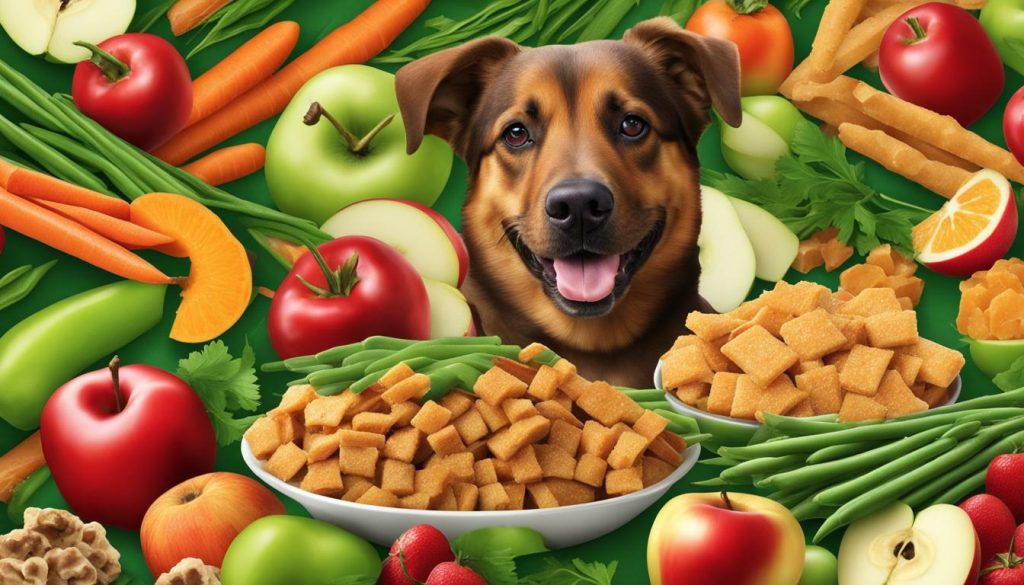
Offering your dog a variety of healthy snacks provides them with a tasty treat and ensures that they receive the nutrition they need to thrive. You can keep your furry friend happy and healthy by choosing these healthier alternatives to chicharrones.
What to Do if a Dog Consumes Chicharrones
If your dog has consumed chicharrones and shows signs of vomiting, diarrhea, or salt poisoning, it’s crucial to seek veterinary attention immediately. While a small amount of chicharrones may not cause significant harm, larger quantities or regular consumption can pose serious health risks to your furry friend.
Pork rinds are high in fat, sodium, and calories, which can lead to obesity, pancreatitis, and high blood pressure in dogs. The seasonings and additives commonly found in chicharrones, such as spicy flavors or garlic and onion seasonings, can also be toxic to dogs. Being proactive and monitoring your dog for any unusual symptoms or discomfort after consuming chicharrones is important.
If you notice your dog experiencing digestive issues or exhibiting signs of salt poisoning, such as excessive thirst, tremors, or seizures, it’s essential to contact your veterinarian immediately. They can provide proper guidance and advice based on your specific situation. Early intervention is key in preventing further complications and ensuring your dog’s well-being.

As responsible pet owners, it’s important to prioritize the health and safety of our dogs. Instead of offering them chicharrones as a treat, consider providing healthier alternatives such as dehydrated pork treats or other dog-friendly snacks. These alternatives are typically lower in fat, sodium, and calories, making them a safer choice for your canine companion.
By being mindful of what we feed our dogs and ensuring they have a balanced and nutritious diet, we can contribute to their overall well-being and longevity. Remember, prevention is always better than cure, and making informed choices about our pets’ diet can go a long way in keeping them healthy and happy.
Importance of Balanced and Nutritious Diets for Dogs
Maintaining a balanced and nutritious diet is essential for dogs to live a healthy and happy life. Just like humans, dogs require a proper combination of nutrients to support their overall well-being. A well-balanced diet promotes healthy growth, improves immune function, helps maintain a healthy weight, and reduces the risk of developing various health issues.
Regarding chicharrones, it is important to recognize that they do not provide the necessary nutrients that dogs need. Chicharrones are high in fat, sodium, and calories, making them unsuitable for a dog’s diet. Feeding dogs high-fat foods regularly can lead to obesity, increasing the risk of developing other health problems like diabetes and joint issues.
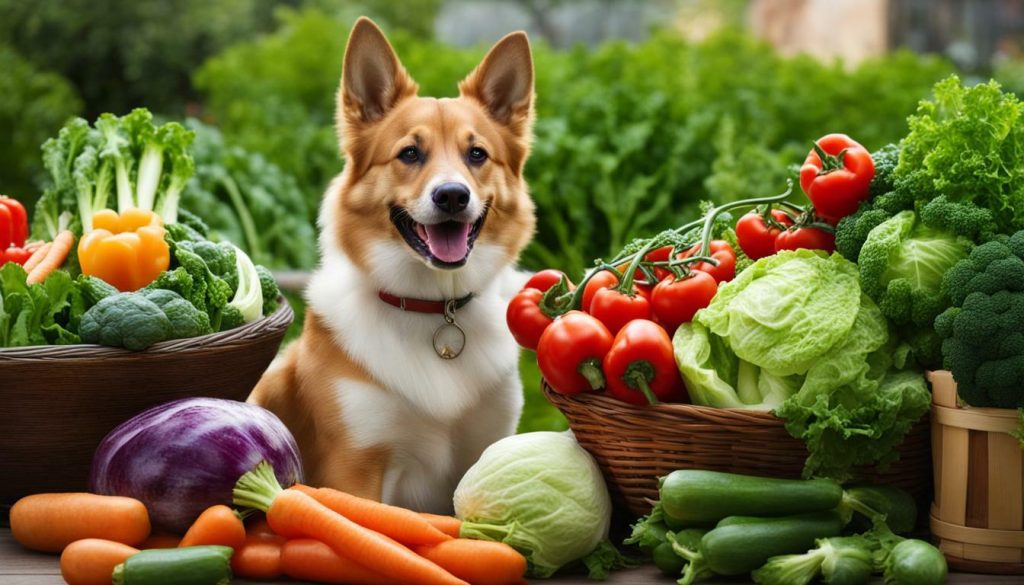
In addition, chicharrones contain seasoning and additives that can be toxic to dogs. Common seasonings like garlic and onion, often found in pork rinds, can be harmful and even cause damage to a dog’s red blood cells. This highlights the importance of being cautious about the foods we offer our furry friends and sticking to a diet of pet-friendly alternatives.
A balanced and nutritious diet for dogs should primarily consist of high-quality commercial food specifically formulated to meet their nutritional needs. It should include a proper balance of protein, carbohydrates, healthy fats, vitamins, and minerals. Additionally, offering occasional healthy snacks like dehydrated pork treats or other dog-friendly options can provide variety while maintaining their overall health.
Conclusion
In conclusion, while chicharrones may be a tempting snack, they are not safe for dogs due to their high fat, sodium, and calorie content and the potential toxicity of seasonings and additives. Dogs have different dietary needs than humans; feeding them fatty and salty foods like chicharrones can have serious health consequences.
Pork rinds are packed with unhealthy fats that can lead to weight gain and obesity in dogs. Additionally, the high sodium content in chicharrones can strain a dog’s kidneys and contribute to high blood pressure. These health issues can greatly impact a dog’s quality of life and even lead to more serious conditions like pancreatitis.
Furthermore, the seasonings and additives in chicharrones, such as spicy flavors or garlic and onion seasonings, can be toxic to dogs. These ingredients can cause digestive upset, allergic reactions, and even damage a dog’s red blood cells. It is crucial to prioritize a dog’s well-being and avoid exposing them to potentially harmful substances.
Instead of offering chicharrones to your furry friend, consider healthier alternatives specifically designed for dogs. Many dog-friendly snacks, such as dehydrated pork treats or low-fat, low-sodium options, are available. These alternatives can satisfy your dog’s cravings while providing them the nutrition they need to thrive.
If your dog accidentally consumes chicharrones and shows symptoms such as vomiting, diarrhea, or signs of salt poisoning, it is important to seek veterinary attention immediately. Prompt medical care can help prevent complications and ensure your dog’s well-being.
Remember, providing your dog with a balanced and nutritious diet is essential for their overall health and longevity. One aspect of responsible pet ownership is avoiding foods like chicharrones that can harm dogs. By making informed decisions about your dog’s diet, you are taking an important step toward keeping them happy and healthy.
FAQ
Can dogs eat chicharrones?
No, chicharrones are not safe for dogs to eat. They are high in fat, sodium, and calories, which can lead to health issues in dogs.
Why are chicharrones not safe for dogs?
Chicharrones are not safe for dogs because they can cause health problems such as obesity, pancreatitis, and high blood pressure. The seasoning and additives in chicharrones can also be toxic to dogs.
Are chicharrones high in fat and sodium?
Yes, chicharrones are high in fat and sodium, which can be detrimental to a dog’s health and nutrition.
What health issues can be associated with chicharrones?
Dogs eating chicharrones may develop health issues such as obesity, pancreatitis, and high blood pressure.
Can the seasoning and additives in chicharrones be harmful to dogs?
Yes, the seasoning and additives in chicharrones can be toxic to dogs, especially if they contain ingredients like spicy flavors, garlic, or onion seasonings.
Can dogs eat a small amount of chicharrones?
If a dog consumes a small amount of chicharrones, they may be fine. However, it is best to avoid giving dogs chicharrones altogether to prevent any potential health issues.
What are some healthier alternatives to chicharrones for dogs?
There are many healthier alternatives to chicharrones that you can offer your dog, such as dehydrated pork treats or other dog-friendly snacks.
What should I do if my dog consumes chicharrones?
If your dog accidentally consumes chicharrones and exhibits symptoms such as vomiting, diarrhea, or signs of salt poisoning, it is recommended to seek veterinary attention.
Why is a balanced and nutritious diet important for dogs?
Providing dogs with a balanced and nutritious diet is crucial for their overall health and well-being, and helps to prevent health issues associated with unhealthy food choices.

